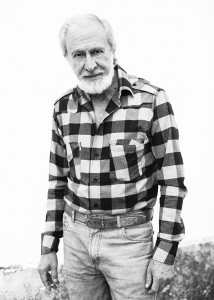It’s a phenomenon of our time: Musicians who fell into oblivion already during their productive period, achieve unexpected worldwide success decades later. With Nick Drake it took until his death. It was the documentary “Searching For Sugar Man” that helped to pay the long overdue international respect for Sixto Rodriguez. And Bernard Fevre aka Black Devil has to thank the strengthening Cosmic Disco scene and Aphex Twin above all that he’s now going through his second adolescence. Similar things could, no they by all means will, happen to Daniel Grau. In this case it’s the archaeology department of Sonar Kollektiv (with great assistance by befriended Venezuelan DJ Trujillo) which supports the highly gifted South American studio whiz to establish his worldwide breakthrough thirty years after his last release.
Daniel Grau Sosa was born in Caracas, Venezuela in 1950. In the early 1970s he was one of the most sought after studio engineers of the country and its quite assessable, but nonetheless zealous music scene. Even the biggest stars of the Onda Nuevas (the Venezuelan version of Bossa Nova), like Aldemaro Romero, made use of Grau’s services. But at the point when the German descent Vytas Brenner brought Progressive Rock and eventually also Fusion Jazz up to Cosmic Disco to Venezuela, Grau couldn’t and wouldn’t want to seek shelter any longer behind his big mixing board in his studio. Without any engagement he asked some of the musicians and artists who frequented his studio off and on to form together with him La Orquestra De Daniel Grau“ releasing two albums just for fun („Dejando Volar El Pensamiento” from 1974 and “Mas de las Estrellas” from 1976). These two releases already display marvelously what kind of an adept composer, arranger and multi-instrumentalist (guitar, bass and keyboards) Grau was and still is. On „Dejando Volar El Pensamiento”, “La Ceiba”, “Delirio En Fa Menor” and “Prama“ the influences and references, which characterize his entire, short and Venezuela-only career, are unmistakeable: North American Fusion Jazz, orchestral Bossa Nova and Latin American funk in the sense of Eumir Deodato and Sergio Mendes.
Only after his collaboration with Vytas Brenner (on the epic and
by now very rare album “Jayeche”) Grau turned towards the
globally sloshing disco wave. He now availed himself of the
production and composition techniques of luminaries like
Giorgio Moroder or Jean-Marc Cerrone – but always remaining faithful to his very own interpretation of disco music. In hindsight one almost has to say that “Atlantis” (off the 1979 LP “Disco Fantasy”) is a straight-forward reinterpretation of Don Ray’s “Garden of Love” and “Funky Bip-Bot” (off the 1982 released album “440 Torker”) bears more than a slight likeness to “Dyin’ To Be Dancing” by Empress. But it’s this reckless, semi-naive approach of absorbing the then current movements which makes Grau’s music so timelessly carefree today. He didn’t even bother to stage his music in front of an audience and kept his local stardom to that of being an exclusive studio project.
Up to 1983 Daniel Grau released nine long players, first on London Records’ local subsidiary then on the label El Palacio De La Musica, where Simon Diaz released his records. On the present showcase compilation “The Magic Sound Of Daniel Grau – compiled by Jazzanova & Trujillo” tracks of all albums are to be found.
All of these releases offer a wide spectrum of musical styles like Disco, Funk, Rock and Latin rhythms like Venezuelan Joropo and Brazilian Bossa Nova. Combined with the tropical Cosmic inspired artwork by Miguel Jaimes and Alejandro Perez a magical Cosmic Caribe’s world is created. Sonar Kollektiv was able to engage the internationally renowned and Latin Grammy award winning, Venezuelan artist MASA for designing a collage of this unique universe.
When 14 years ago Grau’s long-standing wife, mother of his two children and background singer on almost all of his records, Velia, died precociously his already buried musical career didn’t look like it would ever resurrect. But the notorious global digger and blogger scene suddenly discovered now also the music by the forgotten Venezuelan. Even the Chemical Brothers played tracks like „El Leon Bailarin“ (off the album with the same name from 1980) about five years ago regularly in their sets. But only Sonar Kollektiv made the effort to contact the by-now 64-year-old Daniel Grau discussing with him the release of a complete, comprehensive show case compilation. Thanks to the cultural exchange program by the Goethe Institute Jazzanova member Claas Brieler visited Venezuela in 2012 and came in contact with the native young house and nudisco scene, in which Grau has become somewhat like a hero over all the years. Soon, together with Andres Astorga aka Trujillo, the plan was contemplated to make Daniel Grau’s music accessible to a wider audience than there ever was. For Grau, being currently in a new relationship again, the negotiations with Sonar Kollektiv turned out to be the second starting signal for his career: After a 30- year-long studio abstinence he obtained Ableton Live and is now composing new music again (“To Night” is a teaser of the things to come). For the official release of the compilation plans are made to host the very first live concert of Daniel Grau.
The compilation, a double CD, encompasses 27 of the best works out of Daniel Grau’s archives. Since they couldn’t be found on tape reels anymore Calyx Mastering in Berlin had to do an even better job than they usually do. These meticulous restorations went so far that now the tracks we can listen to sound even better than the original recordings on vinyl. Therefore there’s finally nothing standing in Daniel Grau’s way to enjoy worldwide success!
Facebook / Discogs / Soundcloud / #DanielGrau










